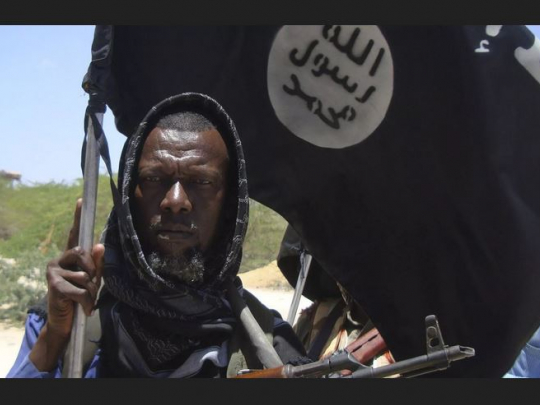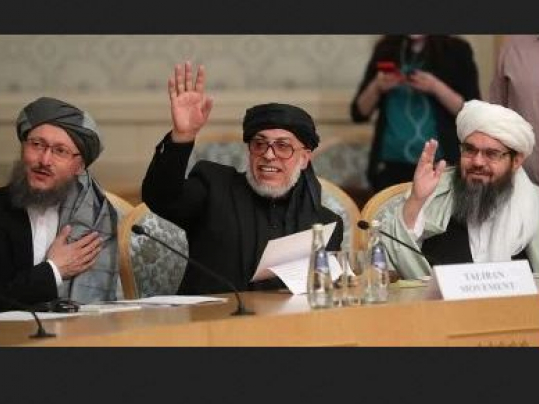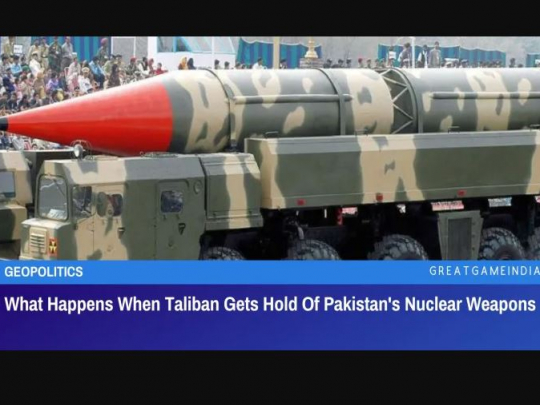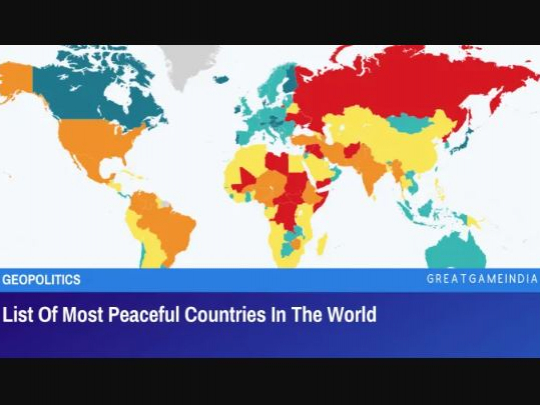Donald Rumsfeld was a criminal in a suit and tie
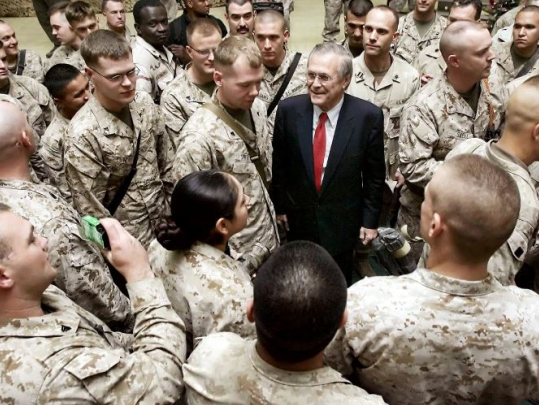
Donald Rumsfeld was a criminal in the guise of a banal, semi-coherent bureaucrat in a well-tailored suit and tie.
Stripped of all the de rigueur embroidery, that is the epitaph that instantly came to mind when I heard of his passing yesterday.
That is also how, I suspect, he will be remembered by the many damaged people who inhabit what remains of the many damaged places where he caused such harm, suffering, and grief.
And, if truth is any guide, that is how he must be remembered by anyone not blinded by the litany of agreeable lies that will be told now about who and what Rumsfeld was.
In this predictable regard, there will be the usual effusive eulogies, authored by the usual obsequious suspects heralding a life of stellar, uncompromising service to a succession of, at times, supple presidents and a grateful nation.
For a bitter taste of the near-sickening revisionism that is sure to follow his death, here is the Associated Press describing Rumsfeld “as a skilled bureaucrat and visionary of a modern US military” whose reputation “was unraveled by the long and costly Iraq war.”
By AP’s largely fawning account, Rumsfeld apparently led a rather benign, but accomplished, life – his “skill” and “vision”, regrettably, undone by, alas, one, misguided war.
Not done airbrushing Rumsfeld’s foul career, the AP shared this gooey vignette about the former US Defence Secretary with readers: “‘Rummy,’ as he was often called, was ambitious, witty, energetic, engaging and capable of great personal warmth.”
My goodness.
These are the undeniable moments when the “establishment” press reiterates its establishment credentials by penning oh so charitable and supposedly “nuanced” tributes to powerful men with important titles when the moment demands blunt, unyielding honesty.
Decency cannot permit the quick whitewashing of Rumsfeld’s repellent legacy as a slick, unrepentant warmonger, unapologetic architect of covert torture chambers and a state-sanctioned kidnapping racket known as “renditions” to stand.
Rumsfeld personified – with a divine, obdurate zeal – all the familiar, corrosive, and inhumane aspects of the discredited doctrine of US exceptionalism that has translated, again and again, into despair, destruction, and death across a scarred planet.
In Rumsfeld’s warped geopolitical calculus, the US was the benevolent Globo-cop and he, the happy warrior in a crisp suit and tie, envisioned a world – particularly in the Middle East and Afghanistan – that resembled the mythic, made-in-America ideal of democracy and plurality.
The ugly, unspoken irony, of course, is that one of the defining traits of evangelical believers like Rumsfeld – like the presidents he worked for – is the requisite ability and, indeed, necessity, to maim and kill on an almost incomprehensible scale in order to achieve their alleged philanthropic designs.
Rumsfeld was an obliging functionary who, in deeds and words, enabled – in his flat, bureaucratic monotone – the killers who occupied the Oval Office, otherwise known as the commander-in-chief.
By that measure, Rumsfeld was a success. He ordered others to do the killing from the comfortable, myopic cocoon of the Pentagon – safe, as always, from any real measure of risk or accountability.
So, in the raw residue of the 9/11 terrorist attacks, Rumsfeld and his equally doctrinaire co-conspirators, seized the opportunity to enact their lethal and calamitous imperial blueprints.
First came the invasion of Afghanistan in September 2001 to topple the Taliban and rout al-Qaeda. History and geography should have tempered Rumsfeld’s ingrained instincts to plunge into war. They did not.
The sad, indelible consequences of Rumsfeld’s abiding hubris and strategic folly are plain – countless Afghan innocents and American soldiers disfigured and dead, billions squandered, and a patient and resurgent Taliban poised to reassert its malignant dominion over a wounded people and land two decades after America invaded.
Rumsfeld’s disastrous adventure in Afghanistan was a precursor to the Bush regime’s cataclysmic miscalculation in Iraq.
It was a war of choice borne of a big, manufactured lie – validated and regurgitated by the same establishment press politely eulogising Rumsfeld today – that Saddam Hussein not only possessed weapons of mass destruction but was intent, with a “madman’s” hair-trigger temperament, to unleash them on London and beyond.
Again, Rumsfeld and cocksure company who insisted the war would be quick, cheap, and winnable were forewarned: there were no WMDs; an invasion would destabilise, not “liberate” Iraq and neighbouring countries; and the cost in lives and treasure would be incalculable.
Rumsfeld scoffed at the jittery naysayers and quislings. “I don’t do quagmires,” he once said.
Oh yes, he did.
Iraq and Iraqis still bear the trauma – in mind, body and spirit – of Rumsfeld’s signature conceit, cruelty, and ignorance.
Rumsfeld compounded his cloying negligence by playing eager consigliere to the clandestine, lawless infrastructure set up by George W Bush and Dick Cheney to spy on and discredit enlightened Americans who opposed the wars in Afghanistan and Iraq.
Still, perhaps the most obscene and graphic evidence of Rumsfeld’s inherent criminality was the international network of dungeons organised under his command inside and outside Iraq to torture – using a cumpulsatory array of sick, perverted means and tools – anyone suspected of collaborating with America’s “enemies.”
Rumsfeld considered the rule of law and international codes of conduct quaint, disposable anachronisms as America’s secret thugs went about, with impunity, abducting and delivering human beings like luggage into the torture dungeons where they were abused and forgotten.
Through it all, Rumsfeld flashed a grating grin that was, at once, a sign of his infuriating arrogance and certitude in the rightness of America’s ruinous mission of salvation abroad. His infamous, non-sensical responses to questions about the grievous failures of those campaigns exposed Rumsfeld’s chronic incoherence and fatal vanity.
Rumsfeld likely knew that he would escape being held responsible for the pain and misery he inflicted on so many damaged people, in so many damaged places.
Reportedly, he was able to die at home, surrounded by family.
That is a quiet, gentle fate that Donald Rumsfeld did not deserve and that he denied to so many other damaged people, in so many other damaged places.
- Source : Andrew Mitrovica





